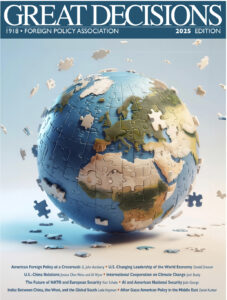 Sponsored by the Foreign Policy Association, Great Decisions is America’s largest discussion program on world affairs. The program involves reading the Great Decisions Briefing Book and meeting to discuss the most critical global issues facing America.
Sponsored by the Foreign Policy Association, Great Decisions is America’s largest discussion program on world affairs. The program involves reading the Great Decisions Briefing Book and meeting to discuss the most critical global issues facing America.
AAUW Naperville Area hosts two groups, AM and PM, both open to AAUW members and the Naperville Area community. The day group meets virtually. The evening group meets in-person at the Naperville Public Library for some sessions, and virtually for others.
The discussions are free but a briefing book is required to fully participate. In October the Great Decisions Briefing Book can be purchased at a 20% discount as part of a bulk order for AAUW Naperville Area. After October the print or electronic book can be ordered directly from the Foreign Policy Organization. There is also a DVD available for purchase that includes master classes on each topic.
Day Group – Nine weeks. Meets Tuesdays, 9:30 – 11:30 a.m., January through March 2025. To participate, contact Lee, leeeastman44@gmail.com.
Evening Group – Nine weeks. Meets Thursdays, 7:15 – 8:45 p.m., January through March 2025. To participate, contact Becky, beckyglimco@gmail.com.
2025 Great Decisions Topics
Each topic provides historical background, examines the subject impartially, explores options facing citizens and policymakers, and debates the implications.
- American Foreign Policy at a Crossroads
- U.S. Changing Leadership of the World Economy
- U.S.-China Relations
- International Cooperation on Climate Change
- The Future of NATO and European Security
- AI and American National Security
- India: Between China, the West, and the Global South
- After Gaza: American Policy in the Middle East
